Evolution of Theoretical Knowledge in Nursing
VerifiedAdded on 2022/11/02
|7
|1808
|314
AI Summary
This article discusses the author's experience in the nursing profession, focusing on the evolution of theoretical knowledge in nursing. It covers the author's transition to BScN, theory analysis, and references.
Contribute Materials
Your contribution can guide someone’s learning journey. Share your
documents today.
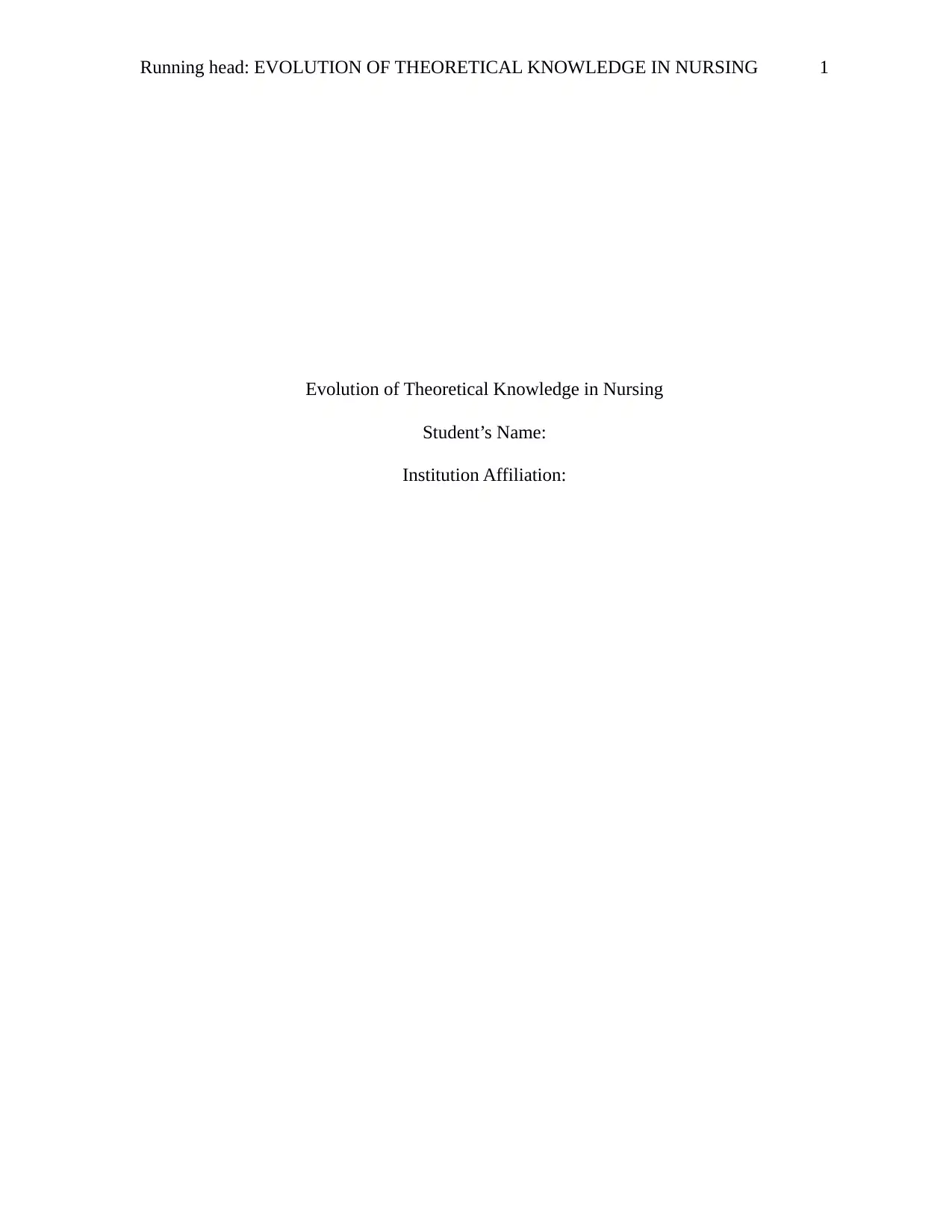
Running head: EVOLUTION OF THEORETICAL KNOWLEDGE IN NURSING 1
Evolution of Theoretical Knowledge in Nursing
Student’s Name:
Institution Affiliation:
Evolution of Theoretical Knowledge in Nursing
Student’s Name:
Institution Affiliation:
Secure Best Marks with AI Grader
Need help grading? Try our AI Grader for instant feedback on your assignments.
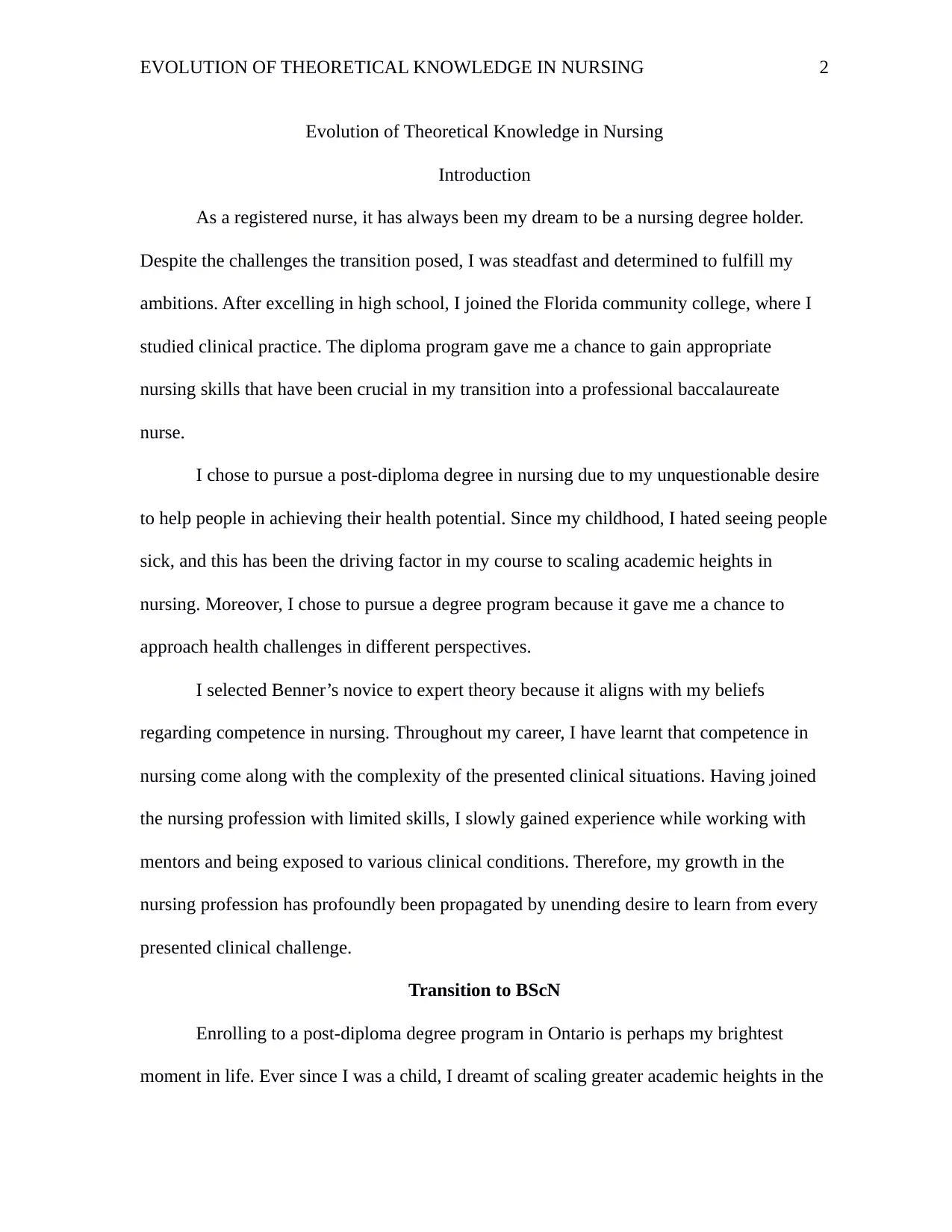
2EVOLUTION OF THEORETICAL KNOWLEDGE IN NURSING
Evolution of Theoretical Knowledge in Nursing
Introduction
As a registered nurse, it has always been my dream to be a nursing degree holder.
Despite the challenges the transition posed, I was steadfast and determined to fulfill my
ambitions. After excelling in high school, I joined the Florida community college, where I
studied clinical practice. The diploma program gave me a chance to gain appropriate
nursing skills that have been crucial in my transition into a professional baccalaureate
nurse.
I chose to pursue a post-diploma degree in nursing due to my unquestionable desire
to help people in achieving their health potential. Since my childhood, I hated seeing people
sick, and this has been the driving factor in my course to scaling academic heights in
nursing. Moreover, I chose to pursue a degree program because it gave me a chance to
approach health challenges in different perspectives.
I selected Benner’s novice to expert theory because it aligns with my beliefs
regarding competence in nursing. Throughout my career, I have learnt that competence in
nursing come along with the complexity of the presented clinical situations. Having joined
the nursing profession with limited skills, I slowly gained experience while working with
mentors and being exposed to various clinical conditions. Therefore, my growth in the
nursing profession has profoundly been propagated by unending desire to learn from every
presented clinical challenge.
Transition to BScN
Enrolling to a post-diploma degree program in Ontario is perhaps my brightest
moment in life. Ever since I was a child, I dreamt of scaling greater academic heights in the
Evolution of Theoretical Knowledge in Nursing
Introduction
As a registered nurse, it has always been my dream to be a nursing degree holder.
Despite the challenges the transition posed, I was steadfast and determined to fulfill my
ambitions. After excelling in high school, I joined the Florida community college, where I
studied clinical practice. The diploma program gave me a chance to gain appropriate
nursing skills that have been crucial in my transition into a professional baccalaureate
nurse.
I chose to pursue a post-diploma degree in nursing due to my unquestionable desire
to help people in achieving their health potential. Since my childhood, I hated seeing people
sick, and this has been the driving factor in my course to scaling academic heights in
nursing. Moreover, I chose to pursue a degree program because it gave me a chance to
approach health challenges in different perspectives.
I selected Benner’s novice to expert theory because it aligns with my beliefs
regarding competence in nursing. Throughout my career, I have learnt that competence in
nursing come along with the complexity of the presented clinical situations. Having joined
the nursing profession with limited skills, I slowly gained experience while working with
mentors and being exposed to various clinical conditions. Therefore, my growth in the
nursing profession has profoundly been propagated by unending desire to learn from every
presented clinical challenge.
Transition to BScN
Enrolling to a post-diploma degree program in Ontario is perhaps my brightest
moment in life. Ever since I was a child, I dreamt of scaling greater academic heights in the
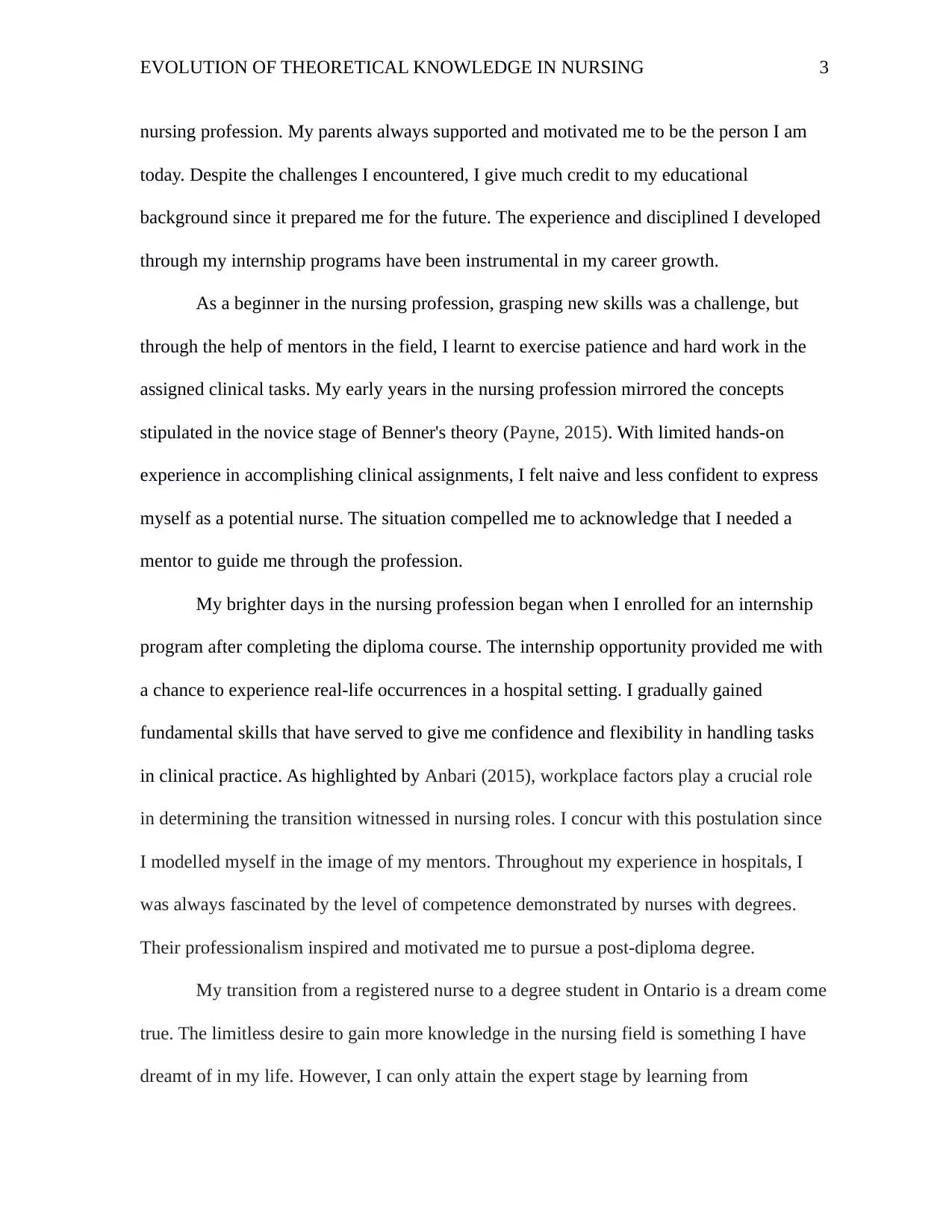
3EVOLUTION OF THEORETICAL KNOWLEDGE IN NURSING
nursing profession. My parents always supported and motivated me to be the person I am
today. Despite the challenges I encountered, I give much credit to my educational
background since it prepared me for the future. The experience and disciplined I developed
through my internship programs have been instrumental in my career growth.
As a beginner in the nursing profession, grasping new skills was a challenge, but
through the help of mentors in the field, I learnt to exercise patience and hard work in the
assigned clinical tasks. My early years in the nursing profession mirrored the concepts
stipulated in the novice stage of Benner's theory (Payne, 2015). With limited hands-on
experience in accomplishing clinical assignments, I felt naive and less confident to express
myself as a potential nurse. The situation compelled me to acknowledge that I needed a
mentor to guide me through the profession.
My brighter days in the nursing profession began when I enrolled for an internship
program after completing the diploma course. The internship opportunity provided me with
a chance to experience real-life occurrences in a hospital setting. I gradually gained
fundamental skills that have served to give me confidence and flexibility in handling tasks
in clinical practice. As highlighted by Anbari (2015), workplace factors play a crucial role
in determining the transition witnessed in nursing roles. I concur with this postulation since
I modelled myself in the image of my mentors. Throughout my experience in hospitals, I
was always fascinated by the level of competence demonstrated by nurses with degrees.
Their professionalism inspired and motivated me to pursue a post-diploma degree.
My transition from a registered nurse to a degree student in Ontario is a dream come
true. The limitless desire to gain more knowledge in the nursing field is something I have
dreamt of in my life. However, I can only attain the expert stage by learning from
nursing profession. My parents always supported and motivated me to be the person I am
today. Despite the challenges I encountered, I give much credit to my educational
background since it prepared me for the future. The experience and disciplined I developed
through my internship programs have been instrumental in my career growth.
As a beginner in the nursing profession, grasping new skills was a challenge, but
through the help of mentors in the field, I learnt to exercise patience and hard work in the
assigned clinical tasks. My early years in the nursing profession mirrored the concepts
stipulated in the novice stage of Benner's theory (Payne, 2015). With limited hands-on
experience in accomplishing clinical assignments, I felt naive and less confident to express
myself as a potential nurse. The situation compelled me to acknowledge that I needed a
mentor to guide me through the profession.
My brighter days in the nursing profession began when I enrolled for an internship
program after completing the diploma course. The internship opportunity provided me with
a chance to experience real-life occurrences in a hospital setting. I gradually gained
fundamental skills that have served to give me confidence and flexibility in handling tasks
in clinical practice. As highlighted by Anbari (2015), workplace factors play a crucial role
in determining the transition witnessed in nursing roles. I concur with this postulation since
I modelled myself in the image of my mentors. Throughout my experience in hospitals, I
was always fascinated by the level of competence demonstrated by nurses with degrees.
Their professionalism inspired and motivated me to pursue a post-diploma degree.
My transition from a registered nurse to a degree student in Ontario is a dream come
true. The limitless desire to gain more knowledge in the nursing field is something I have
dreamt of in my life. However, I can only attain the expert stage by learning from
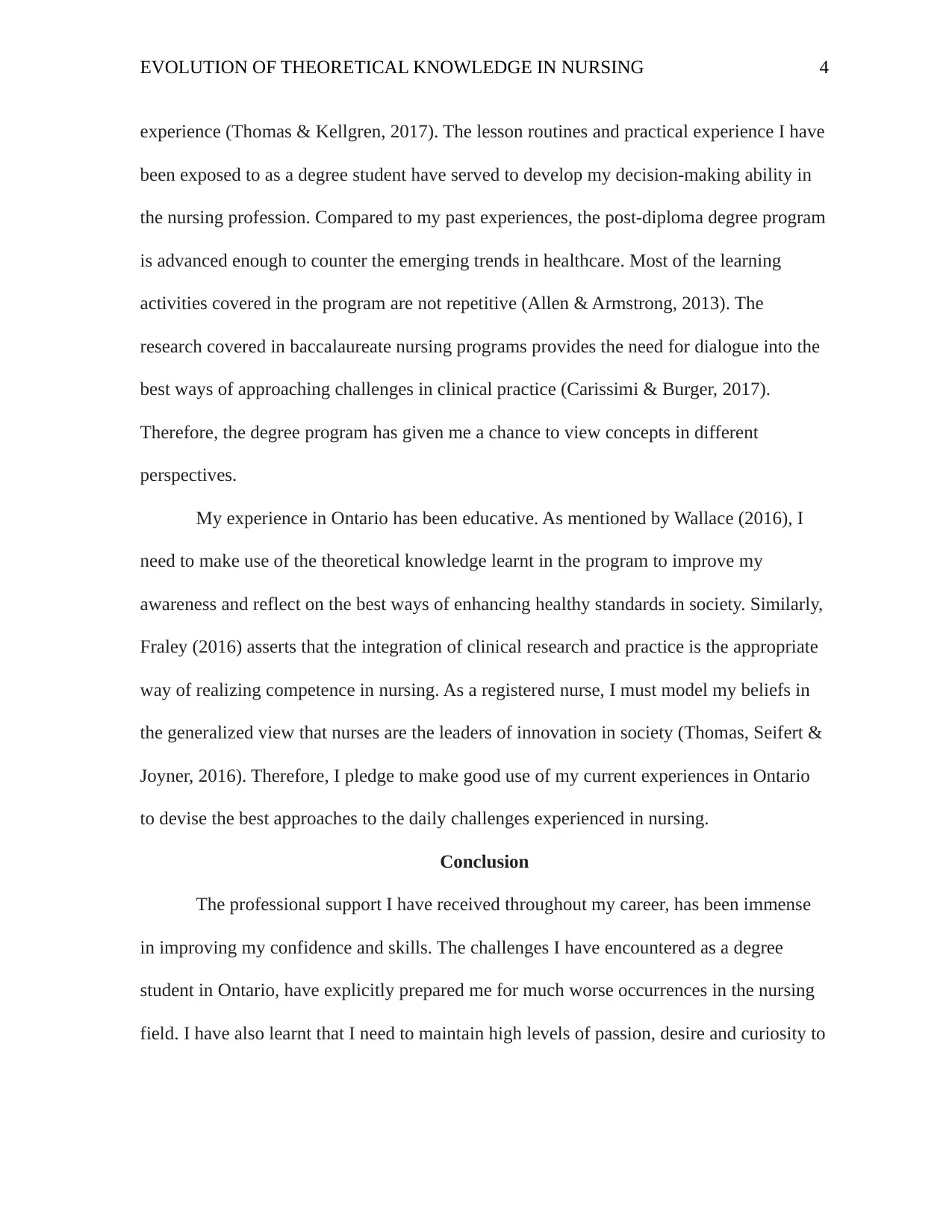
4EVOLUTION OF THEORETICAL KNOWLEDGE IN NURSING
experience (Thomas & Kellgren, 2017). The lesson routines and practical experience I have
been exposed to as a degree student have served to develop my decision-making ability in
the nursing profession. Compared to my past experiences, the post-diploma degree program
is advanced enough to counter the emerging trends in healthcare. Most of the learning
activities covered in the program are not repetitive (Allen & Armstrong, 2013). The
research covered in baccalaureate nursing programs provides the need for dialogue into the
best ways of approaching challenges in clinical practice (Carissimi & Burger, 2017).
Therefore, the degree program has given me a chance to view concepts in different
perspectives.
My experience in Ontario has been educative. As mentioned by Wallace (2016), I
need to make use of the theoretical knowledge learnt in the program to improve my
awareness and reflect on the best ways of enhancing healthy standards in society. Similarly,
Fraley (2016) asserts that the integration of clinical research and practice is the appropriate
way of realizing competence in nursing. As a registered nurse, I must model my beliefs in
the generalized view that nurses are the leaders of innovation in society (Thomas, Seifert &
Joyner, 2016). Therefore, I pledge to make good use of my current experiences in Ontario
to devise the best approaches to the daily challenges experienced in nursing.
Conclusion
The professional support I have received throughout my career, has been immense
in improving my confidence and skills. The challenges I have encountered as a degree
student in Ontario, have explicitly prepared me for much worse occurrences in the nursing
field. I have also learnt that I need to maintain high levels of passion, desire and curiosity to
experience (Thomas & Kellgren, 2017). The lesson routines and practical experience I have
been exposed to as a degree student have served to develop my decision-making ability in
the nursing profession. Compared to my past experiences, the post-diploma degree program
is advanced enough to counter the emerging trends in healthcare. Most of the learning
activities covered in the program are not repetitive (Allen & Armstrong, 2013). The
research covered in baccalaureate nursing programs provides the need for dialogue into the
best ways of approaching challenges in clinical practice (Carissimi & Burger, 2017).
Therefore, the degree program has given me a chance to view concepts in different
perspectives.
My experience in Ontario has been educative. As mentioned by Wallace (2016), I
need to make use of the theoretical knowledge learnt in the program to improve my
awareness and reflect on the best ways of enhancing healthy standards in society. Similarly,
Fraley (2016) asserts that the integration of clinical research and practice is the appropriate
way of realizing competence in nursing. As a registered nurse, I must model my beliefs in
the generalized view that nurses are the leaders of innovation in society (Thomas, Seifert &
Joyner, 2016). Therefore, I pledge to make good use of my current experiences in Ontario
to devise the best approaches to the daily challenges experienced in nursing.
Conclusion
The professional support I have received throughout my career, has been immense
in improving my confidence and skills. The challenges I have encountered as a degree
student in Ontario, have explicitly prepared me for much worse occurrences in the nursing
field. I have also learnt that I need to maintain high levels of passion, desire and curiosity to
Secure Best Marks with AI Grader
Need help grading? Try our AI Grader for instant feedback on your assignments.
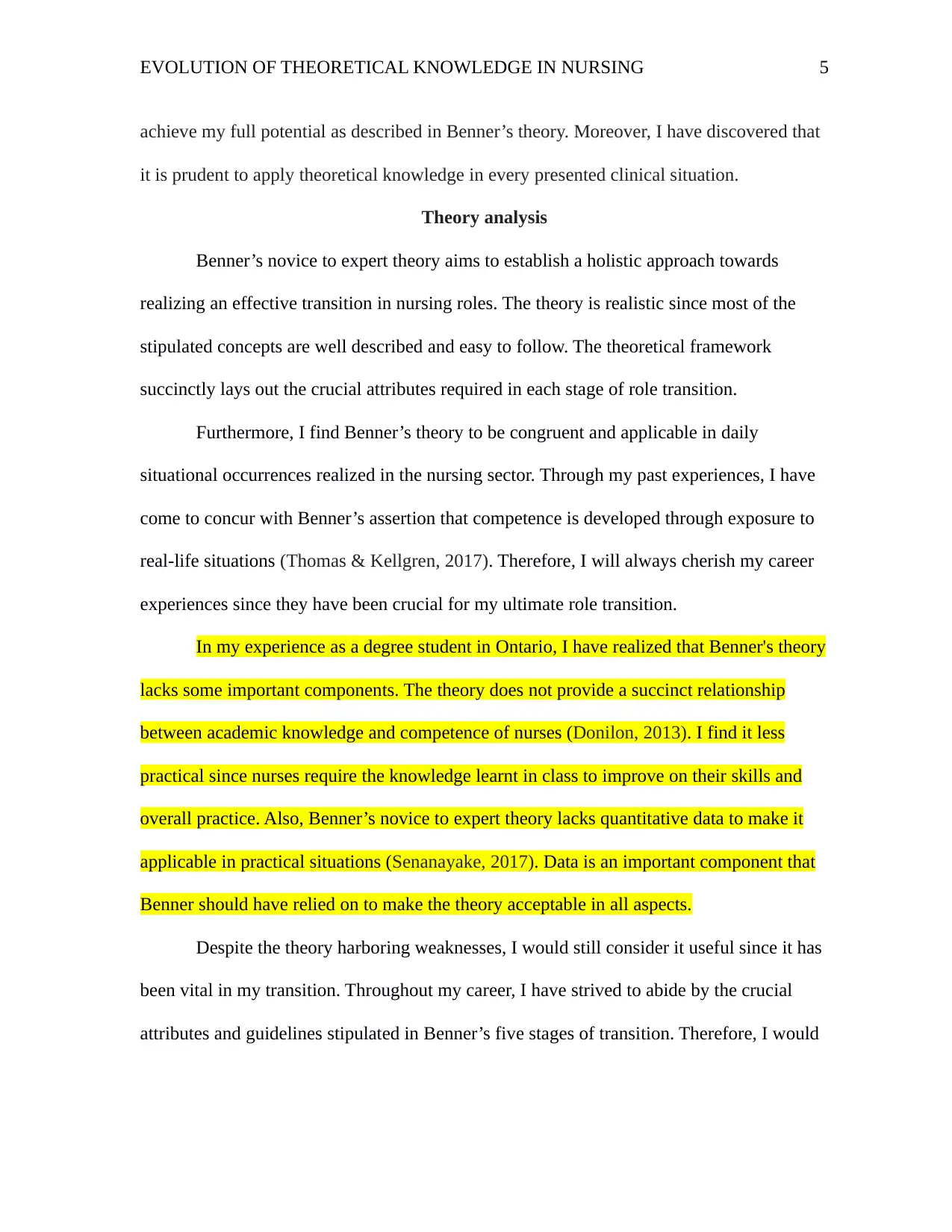
5EVOLUTION OF THEORETICAL KNOWLEDGE IN NURSING
achieve my full potential as described in Benner’s theory. Moreover, I have discovered that
it is prudent to apply theoretical knowledge in every presented clinical situation.
Theory analysis
Benner’s novice to expert theory aims to establish a holistic approach towards
realizing an effective transition in nursing roles. The theory is realistic since most of the
stipulated concepts are well described and easy to follow. The theoretical framework
succinctly lays out the crucial attributes required in each stage of role transition.
Furthermore, I find Benner’s theory to be congruent and applicable in daily
situational occurrences realized in the nursing sector. Through my past experiences, I have
come to concur with Benner’s assertion that competence is developed through exposure to
real-life situations (Thomas & Kellgren, 2017). Therefore, I will always cherish my career
experiences since they have been crucial for my ultimate role transition.
In my experience as a degree student in Ontario, I have realized that Benner's theory
lacks some important components. The theory does not provide a succinct relationship
between academic knowledge and competence of nurses (Donilon, 2013). I find it less
practical since nurses require the knowledge learnt in class to improve on their skills and
overall practice. Also, Benner’s novice to expert theory lacks quantitative data to make it
applicable in practical situations (Senanayake, 2017). Data is an important component that
Benner should have relied on to make the theory acceptable in all aspects.
Despite the theory harboring weaknesses, I would still consider it useful since it has
been vital in my transition. Throughout my career, I have strived to abide by the crucial
attributes and guidelines stipulated in Benner’s five stages of transition. Therefore, I would
achieve my full potential as described in Benner’s theory. Moreover, I have discovered that
it is prudent to apply theoretical knowledge in every presented clinical situation.
Theory analysis
Benner’s novice to expert theory aims to establish a holistic approach towards
realizing an effective transition in nursing roles. The theory is realistic since most of the
stipulated concepts are well described and easy to follow. The theoretical framework
succinctly lays out the crucial attributes required in each stage of role transition.
Furthermore, I find Benner’s theory to be congruent and applicable in daily
situational occurrences realized in the nursing sector. Through my past experiences, I have
come to concur with Benner’s assertion that competence is developed through exposure to
real-life situations (Thomas & Kellgren, 2017). Therefore, I will always cherish my career
experiences since they have been crucial for my ultimate role transition.
In my experience as a degree student in Ontario, I have realized that Benner's theory
lacks some important components. The theory does not provide a succinct relationship
between academic knowledge and competence of nurses (Donilon, 2013). I find it less
practical since nurses require the knowledge learnt in class to improve on their skills and
overall practice. Also, Benner’s novice to expert theory lacks quantitative data to make it
applicable in practical situations (Senanayake, 2017). Data is an important component that
Benner should have relied on to make the theory acceptable in all aspects.
Despite the theory harboring weaknesses, I would still consider it useful since it has
been vital in my transition. Throughout my career, I have strived to abide by the crucial
attributes and guidelines stipulated in Benner’s five stages of transition. Therefore, I would
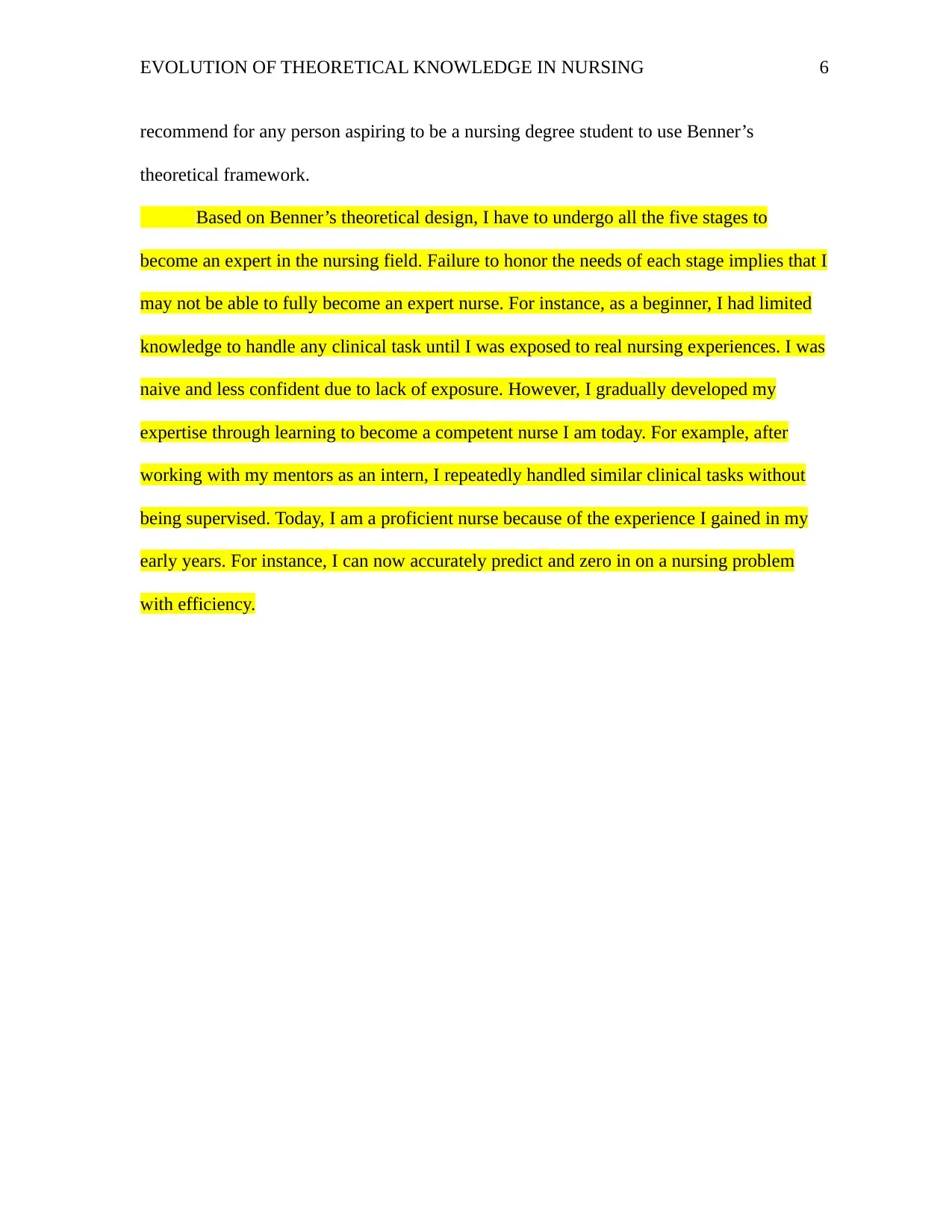
6EVOLUTION OF THEORETICAL KNOWLEDGE IN NURSING
recommend for any person aspiring to be a nursing degree student to use Benner’s
theoretical framework.
Based on Benner’s theoretical design, I have to undergo all the five stages to
become an expert in the nursing field. Failure to honor the needs of each stage implies that I
may not be able to fully become an expert nurse. For instance, as a beginner, I had limited
knowledge to handle any clinical task until I was exposed to real nursing experiences. I was
naive and less confident due to lack of exposure. However, I gradually developed my
expertise through learning to become a competent nurse I am today. For example, after
working with my mentors as an intern, I repeatedly handled similar clinical tasks without
being supervised. Today, I am a proficient nurse because of the experience I gained in my
early years. For instance, I can now accurately predict and zero in on a nursing problem
with efficiency.
recommend for any person aspiring to be a nursing degree student to use Benner’s
theoretical framework.
Based on Benner’s theoretical design, I have to undergo all the five stages to
become an expert in the nursing field. Failure to honor the needs of each stage implies that I
may not be able to fully become an expert nurse. For instance, as a beginner, I had limited
knowledge to handle any clinical task until I was exposed to real nursing experiences. I was
naive and less confident due to lack of exposure. However, I gradually developed my
expertise through learning to become a competent nurse I am today. For example, after
working with my mentors as an intern, I repeatedly handled similar clinical tasks without
being supervised. Today, I am a proficient nurse because of the experience I gained in my
early years. For instance, I can now accurately predict and zero in on a nursing problem
with efficiency.
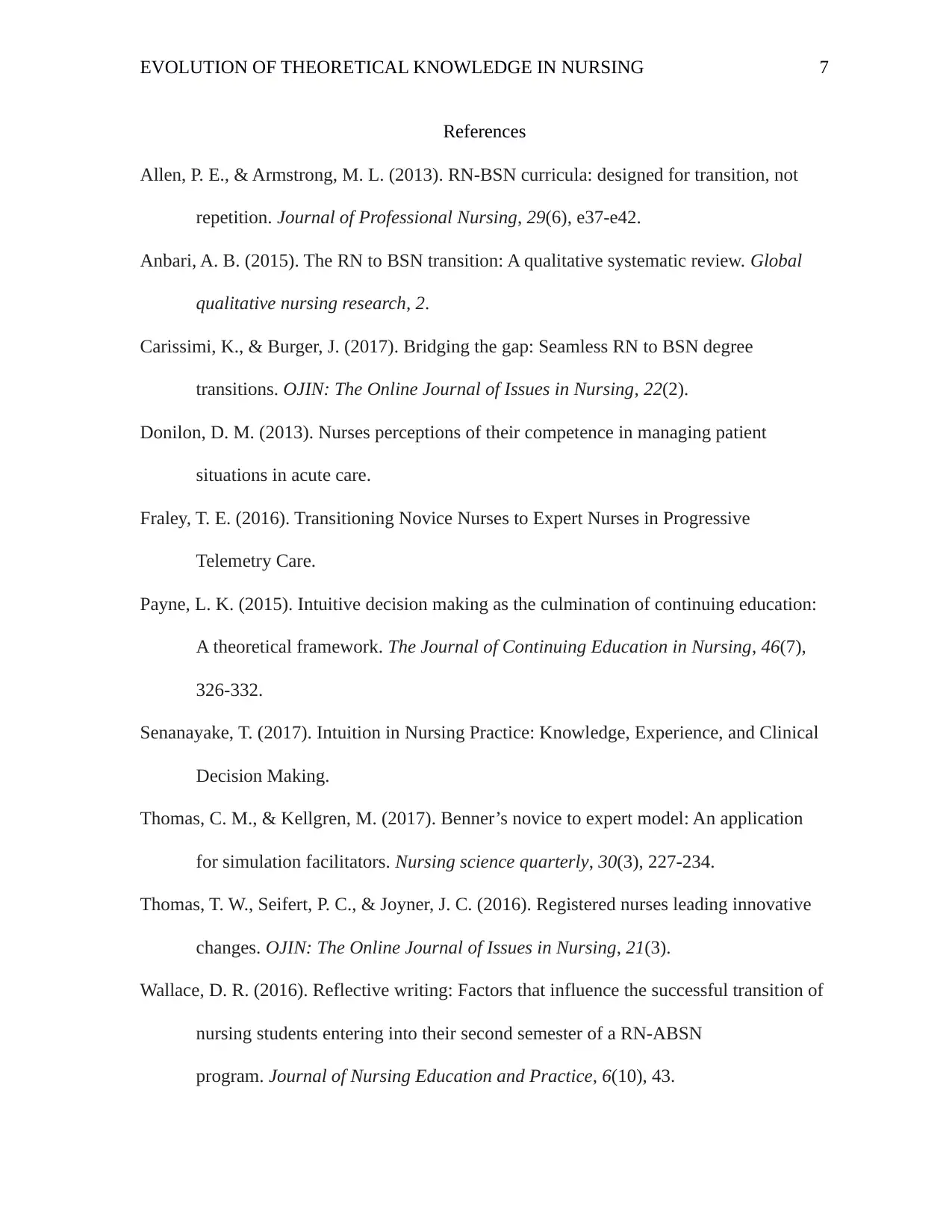
7EVOLUTION OF THEORETICAL KNOWLEDGE IN NURSING
References
Allen, P. E., & Armstrong, M. L. (2013). RN-BSN curricula: designed for transition, not
repetition. Journal of Professional Nursing, 29(6), e37-e42.
Anbari, A. B. (2015). The RN to BSN transition: A qualitative systematic review. Global
qualitative nursing research, 2.
Carissimi, K., & Burger, J. (2017). Bridging the gap: Seamless RN to BSN degree
transitions. OJIN: The Online Journal of Issues in Nursing, 22(2).
Donilon, D. M. (2013). Nurses perceptions of their competence in managing patient
situations in acute care.
Fraley, T. E. (2016). Transitioning Novice Nurses to Expert Nurses in Progressive
Telemetry Care.
Payne, L. K. (2015). Intuitive decision making as the culmination of continuing education:
A theoretical framework. The Journal of Continuing Education in Nursing, 46(7),
326-332.
Senanayake, T. (2017). Intuition in Nursing Practice: Knowledge, Experience, and Clinical
Decision Making.
Thomas, C. M., & Kellgren, M. (2017). Benner’s novice to expert model: An application
for simulation facilitators. Nursing science quarterly, 30(3), 227-234.
Thomas, T. W., Seifert, P. C., & Joyner, J. C. (2016). Registered nurses leading innovative
changes. OJIN: The Online Journal of Issues in Nursing, 21(3).
Wallace, D. R. (2016). Reflective writing: Factors that influence the successful transition of
nursing students entering into their second semester of a RN-ABSN
program. Journal of Nursing Education and Practice, 6(10), 43.
References
Allen, P. E., & Armstrong, M. L. (2013). RN-BSN curricula: designed for transition, not
repetition. Journal of Professional Nursing, 29(6), e37-e42.
Anbari, A. B. (2015). The RN to BSN transition: A qualitative systematic review. Global
qualitative nursing research, 2.
Carissimi, K., & Burger, J. (2017). Bridging the gap: Seamless RN to BSN degree
transitions. OJIN: The Online Journal of Issues in Nursing, 22(2).
Donilon, D. M. (2013). Nurses perceptions of their competence in managing patient
situations in acute care.
Fraley, T. E. (2016). Transitioning Novice Nurses to Expert Nurses in Progressive
Telemetry Care.
Payne, L. K. (2015). Intuitive decision making as the culmination of continuing education:
A theoretical framework. The Journal of Continuing Education in Nursing, 46(7),
326-332.
Senanayake, T. (2017). Intuition in Nursing Practice: Knowledge, Experience, and Clinical
Decision Making.
Thomas, C. M., & Kellgren, M. (2017). Benner’s novice to expert model: An application
for simulation facilitators. Nursing science quarterly, 30(3), 227-234.
Thomas, T. W., Seifert, P. C., & Joyner, J. C. (2016). Registered nurses leading innovative
changes. OJIN: The Online Journal of Issues in Nursing, 21(3).
Wallace, D. R. (2016). Reflective writing: Factors that influence the successful transition of
nursing students entering into their second semester of a RN-ABSN
program. Journal of Nursing Education and Practice, 6(10), 43.
1 out of 7
Related Documents
Your All-in-One AI-Powered Toolkit for Academic Success.
+13062052269
info@desklib.com
Available 24*7 on WhatsApp / Email
![[object Object]](/_next/static/media/star-bottom.7253800d.svg)
Unlock your academic potential
© 2024 | Zucol Services PVT LTD | All rights reserved.





